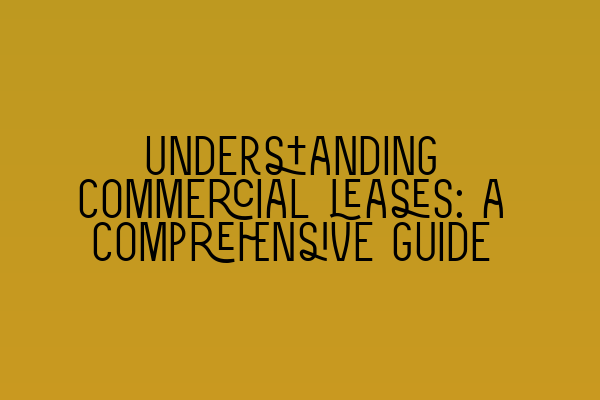Understanding Commercial Leases: A Comprehensive Guide
In the world of property law, commercial leases play a significant role. Whether you are a landlord or a tenant, having a clear understanding of the intricacies of commercial leases is essential to protect your rights and ensure a smooth leasing process. In this comprehensive guide, we will dive deep into the world of commercial leases, covering the important aspects, legal terms, and key considerations involved. So, let’s get started!
1. Defining Commercial Leases
A commercial lease refers to a legal agreement between a landlord and a tenant, outlining the terms and conditions of renting a commercial property. Unlike residential leases, commercial leases are more complex and customizable as they cater to the diverse needs of businesses. Commercial leases are commonly used for office buildings, retail spaces, industrial warehouses, and more.
2. Types of Commercial Leases
There are several types of commercial leases that landlords can offer to tenants, each with its own set of terms and responsibilities. The most common types include:
a. Gross Lease: The tenant pays a fixed amount of rent, and the landlord covers all the expenses related to the property.
b. Net Lease: The tenant pays a base rent, plus additional expenses such as property taxes, insurance, and maintenance.
c. Triple Net Lease: The tenant pays for all the expenses, including taxes, insurance, maintenance, and utilities, in addition to the base rent.
3. Key Terms and Provisions
Understanding the key terms and provisions in a commercial lease is crucial to ensure a fair and balanced agreement. Here are some important terms to look out for:
a. Lease Term: The duration for which the lease agreement is valid, including any renewal options.
b. Rent: The amount of money the tenant agrees to pay the landlord, along with the frequency of payment.
c. Use Clause: The stipulations on how the tenant can use the commercial space, which may include restrictions on subleasing and specific business activities.
d. Maintenance and Repairs: Clearly defining the responsibilities of the landlord and tenant regarding property maintenance and repairs.
e. Security Deposit: The amount of money paid by the tenant upfront to cover any potential damages or unpaid rent.
f. Renewal and Termination: The process for renewal or termination of the lease agreement, including any notice periods required.
g. Assignment and Subletting: The conditions under which the tenant can assign or sublet the leased premises to another party.
4. Negotiating the Lease
Before signing a commercial lease, both parties should engage in negotiations to ensure their interests are protected. It’s essential to involve a solicitor with expertise in property law to guide you through the negotiation process. They can help navigate the complexities of the lease, understand your rights and obligations, and secure favorable terms on your behalf.
5. Legal Considerations
Commercial leases are subject to various legal considerations that landlords and tenants should be aware of. These considerations may include compliance with local zoning laws, obtaining necessary permits and licenses, and adhering to health and safety regulations. Failure to comply with these legal obligations could lead to penalties, fines, or even eviction.
6. Seek Professional Advice
Given the complexity of commercial leases, it is highly recommended to seek professional advice from experienced solicitors specializing in property law. They can review and draft lease agreements, provide legal guidance throughout the leasing process, and help resolve any disputes that may arise.
Remember, having a solid understanding of your rights and responsibilities as a landlord or tenant is key to a successful commercial leasing experience. By ensuring that all aspects of the lease agreement are clearly defined, negotiated, and legally compliant, you can protect yourself and your business interests.
If you are considering pursuing a career in property law or need preparation for the SQE exams, consider enrolling in SQE Property Law & Land Law courses offered by SQE Prep School. They provide comprehensive preparation materials and resources to help you excel in your examinations. Additionally, you can find information about exam dates and practice exam questions on their website.
In conclusion, understanding commercial leases is essential for anyone involved in the leasing process. By familiarizing yourself with the types of leases, key terms, negotiation strategies, legal considerations, and seeking professional advice, you can navigate the complexities of commercial leases successfully.
We hope this comprehensive guide has provided valuable insights into the world of commercial leases.
